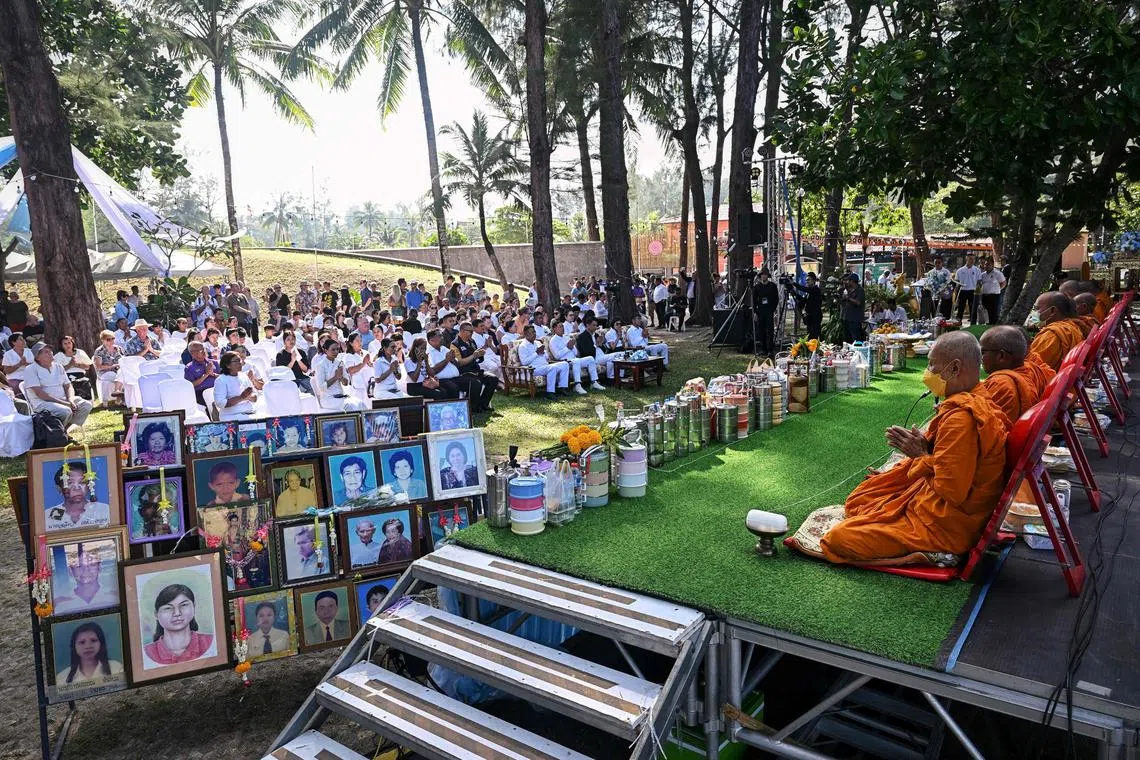Tears, prayers as Asia mourns tsunami dead 20 years on
Sign up now: Get insights on Asia's fast-moving developments
BANDA ACEH, Indonesia – Tearful mourners prayed on Dec 26 as ceremonies began across Asia to remember the 220,000 people who died two decades ago when a tsunami hit coastlines around the Indian Ocean, in one of the world’s worst natural disasters.
On Dec 26, 2004, a 9.1-magnitude earthquake off Indonesia’s western tip generated a series of massive waves that pummelled the coastline of 14 countries from Indonesia to Somalia.
In Indonesia’s Aceh province, where more than 100,000 people were killed, a siren rang out at the Baiturrahman Grand Mosque to kick off a series of memorials around the region, including in Sri Lanka, India and Thailand, which the tsunami hit hours later.
“I thought it was doomsday,” said Mr Hasnawati, a 54-year-old teacher who goes by one name, at the Indonesian mosque that was damaged by the tsunami.
“On a Sunday morning where our family were all laughing together, suddenly a disaster struck and everything’s gone. I can’t describe it with words.”
Some mourners sat and cried at Aceh’s Ulee Lheue mass grave, where around 14,000 are buried, while some villages held their own prayers around the province as they remembered the tragedy
At Aceh’s Siron mass grave, where around 46,000 people were buried, emotional relatives recited Islamic prayers in the shade of trees that have since grown there.
Ms Khyanisa, a 59-year-old Indonesian housewife, lost her mother and daughter. She had searched in vain for them in the hope that they were still alive.
“I kept chanting God’s name. I looked for them everywhere,” she said. “There was a moment where I realised they were gone. I felt my chest was in pain. I screamed.”
Victims of waves as high as 30m included many foreign tourists celebrating Christmas on the region’s sun-kissed beaches, bringing the tragedy into homes around the globe.
The seabed being ripped open pushed waves at double the speed of a bullet train, crossing the Indian Ocean within hours.
In Thailand, where half of the more than 5,000 dead were foreign tourists, commemorations began early in Ban Nam Khem, the country’s worst-hit village.
Tearful relatives of the dead laid flowers and wreaths at a curved wall in the shape of a tsunami wave with plaques bearing victims’ names.
Ms Napaporn Pakawan, 55, lost her older sister and a niece in the tragedy.
“I feel dismay. I come here every year,” she said. “Time flies, but time is slow in our mind.”
After an interfaith ceremony, Italian survivor Francesca Ermini, 55, thanked volunteers for saving her life.
“I think all of us (survivors) when we think about you, it makes us feel so hopeful,” she said.
Unofficial beachside vigils were also expected to accompany a Thai government memorial ceremony.
Candlelight, train vigils
A total of 226,408 people died as a result of the tsunami, according to Em-dat, a recognised global disaster database.
There was no warning of the impending tsunami, giving little time for evacuation, despite the hours-long gaps between the waves striking different continents.
But today, a sophisticated network of monitoring stations
Indonesia suffered the highest death toll, with more than 160,000 people killed along its western coast.
“It feels like it just happened yesterday. Whenever I am reminded of it, it feels like all the blood rushes out of my body,” said Ms Nilawati, a 60-year-old Indonesian housewife who lost her son and mother.
The disaster also ended a decades-long separatist conflict in Aceh, with a peace deal between rebels and Jakarta struck less than a year later.
In Sri Lanka, where more than 35,000 people perished, survivors and relatives gathered to remember around 1,000 victims who died when waves derailed a passenger train.
The mourners boarded the restored Ocean Queen Express and headed to Peraliya – the exact spot where it was ripped from the tracks, around 90km south of Colombo.

Monks sit on a stage next to portraits of tsunami victims as people take part in an interfaith ceremony at a memorial park in southern Thailand.
PHOTO: AFP
A brief religious ceremony will be held with relatives of the dead there, while Buddhist, Hindu, Christian and Muslim ceremonies are also organised to commemorate victims across the South Asian island nation.
Nearly 300 people were killed as far away as Somalia, as well as more than 100 in the Maldives and dozens in Malaysia and Myanmar.
“My children, wife, father, mother, all of my siblings were swept away,” said Indonesian survivor and fisherman Baharuddin Zainun, 70.
“The same tragedy was felt by others as well. We feel the same feelings.”
Ms Dorothy Wilkinson, 56, a Briton who lost her partner and his parents to the tsunami in Thailand, said the commemorations were a time to remember the best of those who died.
“It makes me happy to come... A bit sad,” she said. “It’s celebrating their life.” AFP


